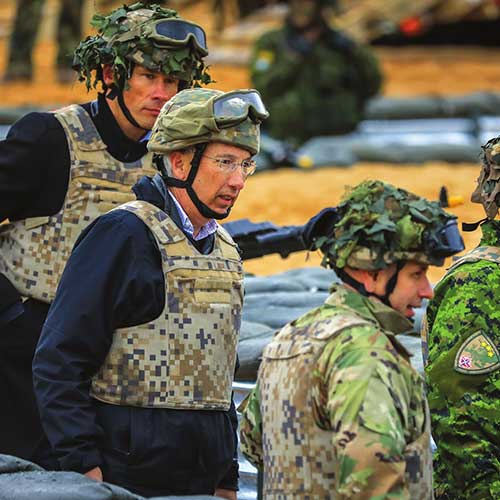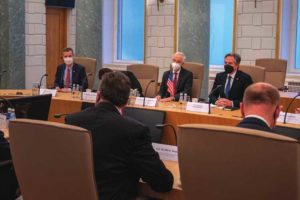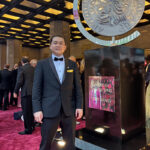
Wooster history alumnus John Carwile ’81 serves as ambassador to Latvia

For 35 years, John Carwile ’81 has dedicated his work to service—serving the United States in foreign countries.
Carwile, who recently completed his tenure as U.S. Ambassador to the Republic of Latvia, admits, “Every post has had challenges.” Carwile dealt with terrorist threats in Peru and protests outside the embassy in Kuala Lumpur. He served in a war zone in Baghdad and navigated the Mission Community through the COVID pandemic during his time in Latvia.
Yet for every challenge, there have been more rewards. Carwile was a member of the team in Nepal that responded when devastating earthquakes rocked Kathmandu in 2015, claiming the lives of about 9,000 people. Citing it as one of his most rewarding experiences, he recalled how they sheltered hundreds of Americans on the embassy compound for several days and arranged evacuation flights. They also supported large-scale relief efforts through the U.S. Agency for International Development and the U.S. III Marine Expeditionary Force from Okinawa.
The career that allowed him to combine his history major and interests in international affairs and political science also granted him the opportunity to live and work overseas with his wife, partner, and fellow Wooster graduate, Karin Hauschild ’84. They are part of a solid Wooster legacy, both having had multiple family members attend the College along with their daughter Katherine, an international relations major who graduated in 2014. Together as lifelong learners, John and Karin have interacted with different cultures, eaten new foods, learned foreign languages, lived in a wide variety of living
conditions, met people they otherwise never would have met, and understood issues up close.
The couple welcomed their global adventures in Washington, D.C.; Lima, Peru; Kuala Lumpur, Malaysia; Rome, Italy (twice); Quito, Ecuador; Bandar Seri Begawan, Brunei; Belfast, Northern Ireland; Ottawa, Canada; Kathmandu, Nepal; and Riga, Latvia. Carwile also did an unaccompanied, one-year posting in Baghdad, Iraq, while his wife and daughters stayed in Ottawa.
“There have been a lot of adventures along the way,” he said. Before he entered the foreign service in 1987, Carwile earned a master’s degree from the Johns Hopkins School of Advanced International Studies in Washington, D.C. and worked at CloseUp, a non-profit educational organization, writing on domestic and international issues. His post in Belfast was “a pretty cool job, working four years on the Northern Ireland peace process, interacting with Nobel Peace Prize winners, Irish nationalists, British unionists, paramilitary members, and local politicians,” he said. In Latvia, he headed the embassy in Riga and led the U.S. bilateral relationship with Latvia, employing 55 Americans plus their families, along with about 120 locally engaged staff from Latvia.

Secretary of State Antony J. Blinken meets with Latvian Prime Minister Krišjānis Kariņš along with Carwile in Riga, Latvia, in 2021. Photo: State Department, Ron Przysucha
The job of embassy staff is “to advance U.S. national interests along a range of issues, includingm protecting American citizens, defense and security matters, and anti-corruption efforts.” U.S. Foreign Service members from the Department of State staff the traditional sections including political, economic, consular, public diplomacy, and management. There also are U.S. military officers and non-commissioned officers in the Defense Attaché Office and the Office of Defense Cooperation that is embedded in the Latvian Ministry of Defense. The embassy staff maintains close coordination with Washington, D.C., especially the State Department, the Pentagon, and the White House.
“I did a lot of personal engagement and relationship building with Latvian government ministers and officials, civil society, and the Latvian military. There’s also a lot of public speaking, press interviews, and other public interactions,” Carwile said.
In February 2022, when Russia re-invaded Ukraine—the Russians first invaded Crimea in 2014—the embassy had to shift its immediate focus. “My Embassy worked along a number of fronts with our Latvian allies—including military and humanitarian aid to Ukraine, NATO force posture in the Baltic states, and bilateral and NATO training exercises. We also had extensive consultations with our Latvian counterparts on coordinating Allied sanction actions and countering Russian disinformation,” he explained.
Latvia has been a leader in NATO and European Union efforts against Russia’s war in Ukraine. “Latvians have painful memories of the Soviet Union’s brutal, 50-year occupation of their country, which only ended in 1991,” he said. If Putin succeeds in Ukraine, Latvians believe he would try to retake the country and the other Baltic states—Estonia and Lithuania. They maintain that “everything must be done to make sure Ukraine wins the war against Russia,” Carwile said.
The embassy also supported visits to Latvia by high-level U.S. officials, including the Secretary of State, Secretary of Defense, Chairman of the Joint Chiefs of Staff, members of the Senate and House of Representatives, and port calls by U.S. Navy warships. Additionally, hundreds of U.S. soldiers have also been deployed to Latvia as a show of American commitment to NATO Ally Latvia and to exercise with soldiers from other NATO member countries that are stationed in Latvia.
Carwile’s career in the Foreign Service “has been an honor. Secretary of State (Madeleine) Albright was right, we are the ‘indispensable nation.’ For whatever shortcomings others may see in us or mistakes we might have made, we remain a tremendous force for good in the world. We are the country that can rally or lead others to protect human rights, promote economic growth, combat hunger, or counter aggression.”
Photo 1: John Carwile ’81 observes the Silver Arrow 2022 exercise live-fire demonstration closing event at Camp Adazi, Latvia, Sept. 29, 2022. Photo by U.S. Army National Guard.
This feature originally appeared in the spring 2023 edition of Wooster magazine.
Posted in Alumni, Magazine on March 15, 2023.
Related Posts
Related Areas of Study
Political Science
The study of power, with concentrations in U.S. politics, international relations, political theory and comparative politics.
Major MinorHistory
Critically examine events and societies of the past and learn to tell the stories future generations need to know
Major MinorGlobal & International Studies
Learn about global challenges and issues using methods in economics, history, and political science coupled with language immersion and study abroad
MajorGlobal Impacts
Turn an interest in international service, economic development, NGOs and INGOs into a career
Pathway

